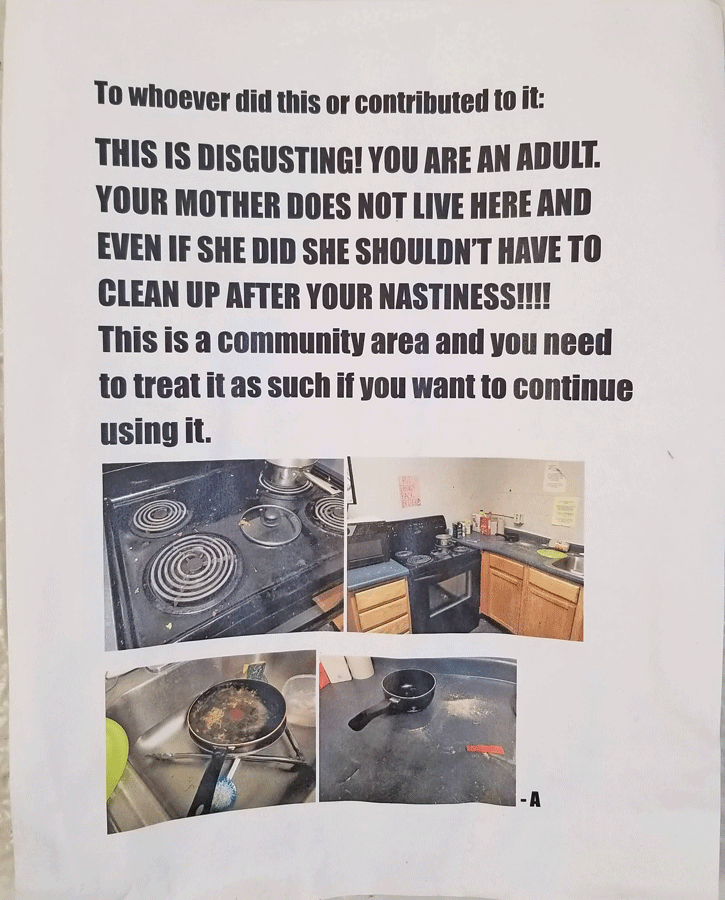Hell’s Kitchen: Martinetti edition
Of the many posters on the walls of the Martinetti kitchen, one stands out. It shows dishes, sinks, and stovetops covered with food scraps and spills. A caption addresses the issue bluntly – “YOUR MOTHER DOES NOT LIVE HERE AND EVEN IF SHE DID SHE SHOULDN’T HAVE TO CLEAN UP AFTER YOUR NASTINESS!!!!”
“That kitchen gets super gross,” says Opal Savoy, a Martinetti resident, when asked about the messiness. Savoy says she mostly uses the kitchen to wash her dishes, and that she once found others’ dirty dishes left in the sink.
“It’s mostly when people don’t clean the dishes that are communal,” April Parent, another resident, says, “and the floor, but there’s only so much you can do about that.”
An ever-growing collection of stains is gathered on the carpet between the oven and the countertop. Pieces of charred food can be seen beneath the burners of the stove.
“It’s just kind of gross in there all the time, and it smells terrible,” says Savoy.
Splatter marks of food are spread above the stove – some even appear on the opposite wall. Wrappers and packaging seem to float from surface to surface of the kitchen before eventually finding the trash can.
“It usually comes up at least once a year,” says Jeff Bickford, director of residential life, when asked about the messiness of the kitchen.
“It is nasty, but it’s exactly what I’d expect from a college kitchen,” says James Teague, who lives in Martinetti. “I always clean the kitchen up before and after I use it.”
Teague’s commitment to cleaning is important. “The staff are not responsible for cleaning up after other people,” says Bickford. “Kitchen cleanliness is a safety issue anyways, no matter what it is… crumbs that are left out will attract rodents… grease that is spilled and left unattended can be a fire hazard.”
Of course, a few college students cleaning the appliances as they use them isn’t always the solution. Bickford says that the staff usually only do a deep clean on the kitchen once or twice a year, but that most of the cleaning should be done by students.
“It’s a lot easier… to advocate for having that access and advocate for keeping it if students are doing their part in keeping it in really good condition,” he said.
When asked, Bickford said speaking to members of residential life is the smartest move when students find someone else’s mess. “I really do want to know about it if it’s an issue,” he says. “It’s a lot easier… to advocate for having that access and advocate for keeping it if students are doing their part in keeping it in really good condition.”
“That’s my go to now – go talk to the RA,” Savoy says. When asked what they would do if they found a huge mess, Teague aims to handle it on their own. “I would take pictures and tell Matt,” they say, “but I would clean it up myself.”
Bickford also explained residential life’s methodology. “Part of the reason that we ask people to always leave the door shut is we then have sort of a record of the traffic in and out,” he said. “If somebody finds it really messy… we can go back to the last person and… educate them a little bit, so that hopefully they’re not continuing to do that.”
“We unfortunately have had to close it at times or restrict access to individuals or small groups,” says Bickford. This isn’t his preferred method, but, “it unfortunately is one of the ways to sort of help motivate people” he says.
“I love having student access to kitchens, even though yes, there’s an increased safety risk, and yes there tends to be issues with messes,” says Bickford. “I think it’s this amazing way to build community.”
While the Martinetti kitchen isn’t at any eminent risk of being shut down, signs still plaster the door, warning users to keep the area clean. While many residents do their best to prevent the mess from accumulating, there is a solution. If you find the sink full of dishes or the stove covered in sauce, the best route is to go to the RA.

Senior, Creative Writing
From Fletcher, VT
Spring 2020-Present
"Call me mommy and I'll bring you blankets and hold you while you cry."



